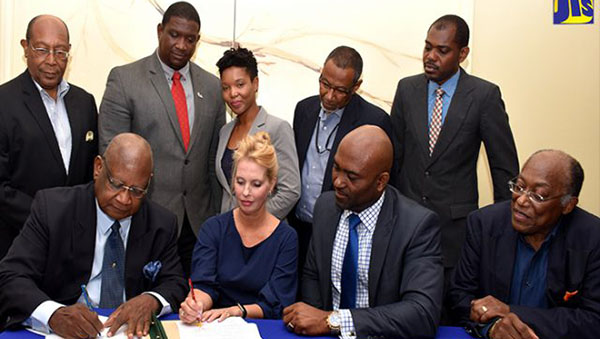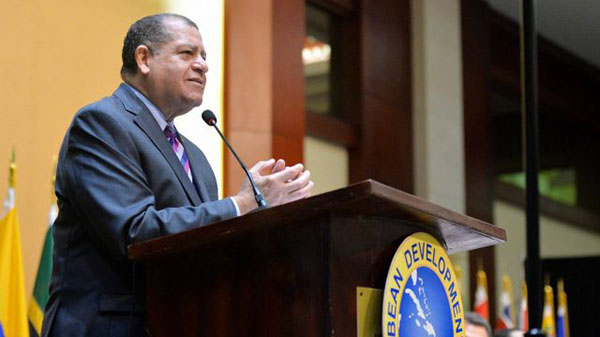KINGSTON, Jamaica, June 27, 2018 (CMC) – Science and Technology Minister, Dr. Andrew Wheatley, says Jamaica must stake its claim on all local strains of marijuana for research and development.
Jamaica is said to have some of the best, or finest, marijuana strains in the world, which include the Jamaican Lamb’s Breath (or Lamb’s Bread) and Marley’s Collie.
“It is like our birthright and we cannot allow persons, from outside, to come and take away our birthright. We have to position ourselves, we have to take on the mantle (and) do what we have to do… as it relates to medicinal marijuana research,” the Minister added.
Wheatley was addressing the signing of a memorandum of understanding (MOU) between the Jamaican Medical Cannabis Corporation (JMCC) Limited and the National Foundation for the Development of Science and Technology (NFDST) on Monday.
The MOU formalises an agreement, between the entities, to undertake a project that will identify, isolate and conserve the local strains of cannabis for medicinal use, utilising advanced plant biotechnological, botanical and agricultural methods.
It also aims to strengthen Jamaica’s contribution to the local and international health industries, through the provision of raw materials and value-added medicinal products.

Dr. Andrew Wheatley (second left); Diane Scott (second right) CEO of JMCC Limited; Dr. Conrad Douglas (left) Director NFDST; and Professor Errol Morrision (right) Director General of the NCST, display a replica of cheque, representing the investment of US$2million in research and development, over the next 10 years. Photo credit: JIS.
Through the MOU, the Jamaica/Canada-based JMCC have committed to an investment of US$2million in research and development, over the next 10 years.
The NFDST will receive, manage and disburse the funds to a research consortium that will execute the undertaking.
The consortium will consist of members of the National Commission on Science and Technology (NCST), which is the coordinating body; the Scientific Research Council (SRC); and the Caribbean Genetics and the Institute of Jamaica, among other institutions to be identified.
“This project has the potential to catapult the island as the lead expert in medicinal cannabis use, which is a game changer,” Wheatley declared.
“The agreement is another advancement in cementing the solid framework for Jamaica, utilising science and technology to energise, innovate and empower, (which) changes the game,” he added.
Wheatley said the project will enable “Jamaica to be among the first to position itself to create, discover and enter new frontiers”, to not only ensure development of a sustainable cannabis industry, but also for the growth of the nation.
Meanwhile, Professor Errol Morrison, Director General of the National Commission on Science and Technology, said the project — titled ‘Identification, Isolation and Conservation of Local Strains of Cannabis for Medicinal Use’ — will use advanced plant bi-technical, botanical and agricultural methods to identify and preserve local strains of indigenous marijuana.
“What you are about to witness is the dedication of our scientific community to eventually [map] the scientific identification of our strain. Not a look, touch, smell, feel (but) DNA science to underpin what it is that we have been making claims for centuries,” he said.
“We shall be using a nutraceutical affirmation of the claims for health benefits, down the road, and we shall be archiving these claims for posterity, so that we can assure, a hundred years from now, that Strain X shall be Strain X and not hybridised out or cross-fertilised in any way,” Morrison added.
Earlier in the week, Agriculture Minister, Audley Shaw, said he will be moving to ensure that Jamaica is not left behind in the growing global medical cannabis industry.
Shaw, in a recent address at an Agricultural Technology Symposium, noted that while Jamaica has only decriminalised the use of up to two ounces of marijuana and issued a few licences for production and processing, the product is now legal in Canada, and 31 states in the United States have been producing and using it for medicinal and recreational purposes.
He said the country needs to move, quickly, to take advantage of opportunities in the growing of cannabis and manufacture of products.
He said that he is working with the Ministry of Health and the Cannabis Licensing Authority (CLA) “to move faster and more aggressively to get up to the level of world competition”.
“Time is not on our side,” he added.
Shaw told the participants at the symposium, which included farmers, that agriculture is a key sector in enabling Jamaica to achieve sustained, high levels of economic growth.
He noted that the sector’s contribution to gross domestic product (GDP) has improved, moving from 6.6 percent in 2015 to 7.3 percent in 2017.
The Agriculture Minister revealed that focus is being placed on research and development in order to transform the industry.
It is for this reason, he said, that the Ministry, last year, began the redevelopment of the Bodles Research Station in the central parish of St. Catherine, through an J$800 million project.
The Agriculture minister explained that the push to grow the sector, also involves an aggressive youth-in-agriculture program, rationalising idle lands, and looking to markets within the Caribbean Community (CARICOM).
Meanwhile, Minister without Portfolio, J.C. Hutchinson, said research is critical for the agriculture sector, because the existing culture of the farmers has to change.
He said traceability is important because “the day is fast approaching, when all exported and imported goods will have to be traced back to the place of origin, in order to determine how it was treated, as well as the pesticides and fertilisers used”.
 Pride News Canada's Leader In African Canadian & Caribbean News, Views & Lifestyle
Pride News Canada's Leader In African Canadian & Caribbean News, Views & Lifestyle







Such hypocrites! All the years you and your friends have oppressed Jamaicans particularly Rasta’s for herb and now you’re front and centre using the said herb now to make money!
Wow this is a revolution for the oppressors! You want to seed save our finest variety of herb? This is truly a different level of oppression for herb users, farmers and artisans now!
Don’t let them get your seeds farmers. You have been seed saving for a long time now, please continue.